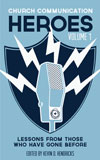I’ll never forget it. I’ve had a lot of “warm and fuzzy” moments in worship, cried at a ton of church camps and “surrendered” my life to Christ several times, but the day the gospel really came alive for me was Easter morning in 1995 when my family and I sang “Christ the Lord is Risen Today” in church. We were watching children carry the traditional flower-covered cross down the center aisle, and suddenly, my faith made sense. Was it:
- “Raise your joys and triumphs high”?
- “Love’s redeeming work is done”?
- “Where, O death, is now thy sting?”
- “Christ has opened paradise”?
Shoot, I don’t know! What wasn’t it, in a hymn that so perfectly captures the bliss that is Easter, and by extension, our Christian faith?
Charles Wesley (1707-1788) wrote that hymn, so you can understand why I think he’s a church communication hero. Charles was an 18th century poet who co-founded the Methodist movement with his brother, John. He wrote 56 volumes of hymns in 53 years. What makes him a church communication hero is this:
Made the Bible Real
He linked the biblical narrative to our human experience: “Israel’s strength and consolation, hope of all the earth thou art; dear desire of every nation; joy of every longing heart.” (from “Come Though Long-Expected Jesus”) Charles’ hymns tell the stories of the Old and New Testament and connect them with what’s going on in the hearts of people.
Emotional Resonance
People react emotionally to what he wrote: “Hark! the herald angels sing, ‘Glory to the new born King, peace on earth, and mercy mild, God and sinners reconciled!” (from “Hark! the Herald Angels Sing”) Charles’ Christmas hymns are only a few classics that people sing joyfully every year. Have you ever sung that hymn and not been nearly elated?
More Than Us
He described the majesty and power of God: “Love divine, all loves excelling, joy of heaven, to earth come down; fix in us thy humble dwelling; all thy faithful mercies crown! Jesus thou art all compassion, pure, unbounded love thou art” (from “Love Divine, All Loves Excelling”) People come to church to be a part of something bigger than themselves; Charles Wesley’s hymns draw them closer to, make them feel they’re a part of, the glory, grandeur and goodness of God.
A Hero for Today
Charles Wesley is one more figure we can look to when we communicate in the church. His goal in the 18th century was to lead people in worship, but also to teach people the faith and encourage their faithfulness in a way only music can. When we take on those same responsibilities in communication, we will bring hope and meaning to the people in our pews too.
 More:
More:
- Learn more about heroes in our ebook, Church Communication Heroes Volume 1: Lessons From Those Who Have Gone Before.
- Check out other heroes in our Church Communication Heroes series.





Chris
December 15, 2012
Thanks for the post! I love Charles – he’s way too often neglected today. If you think about it, though, his theology has probably reached more people through his songs than John’s ever could through sermons and letters.
Edwin N.Toppin
January 5, 2013
Very nice article.
In Charles Wesley we find a theologian, a poet, a pastor , a psalmist, a man who experienced God in his readings and an individual who express his conversion in hymns that inspire all who sing or read, enbling them to rejoice in the fellowship with God and man. “Praise the Lord O my soul”.